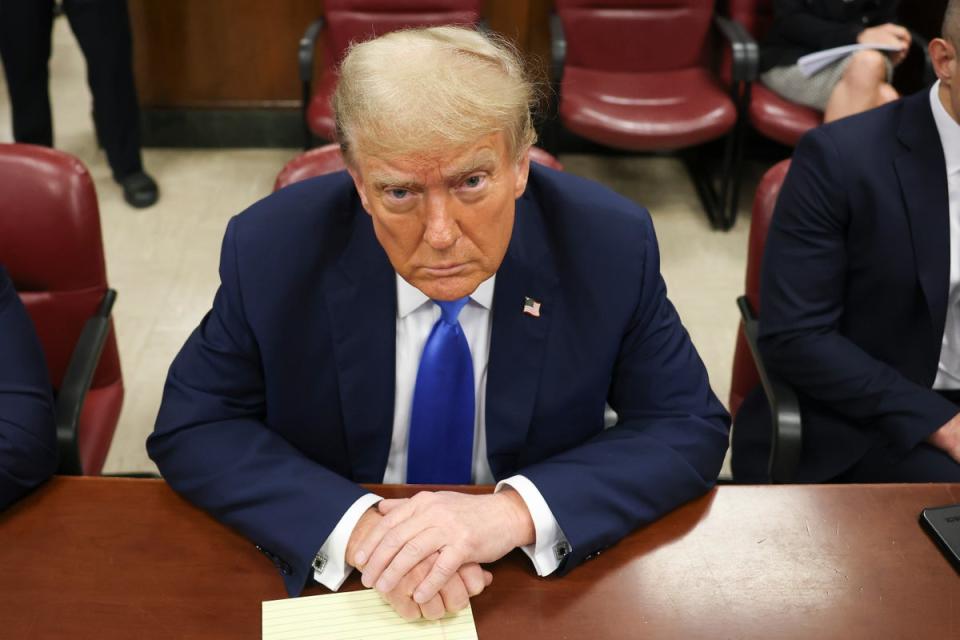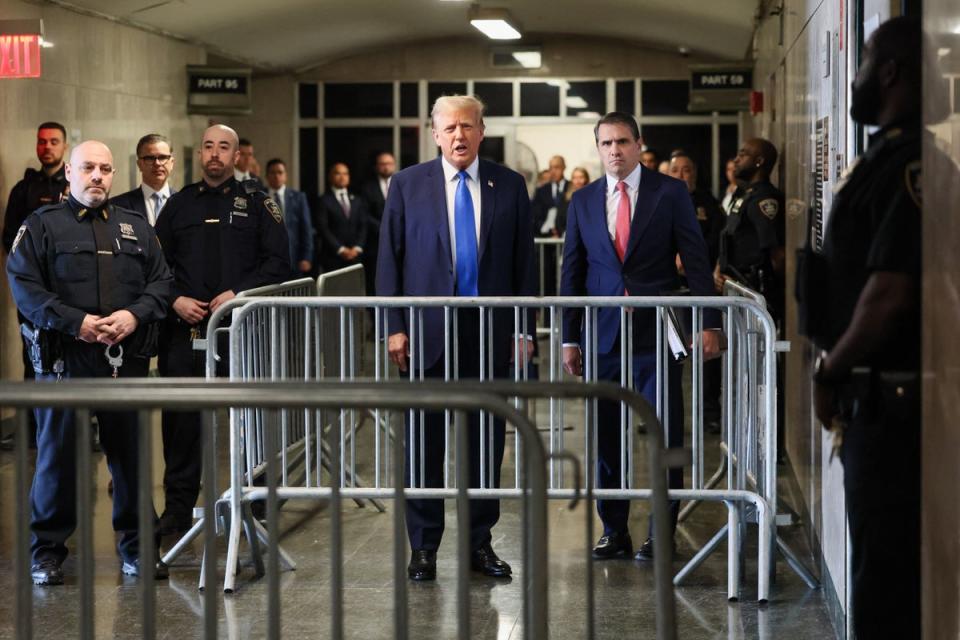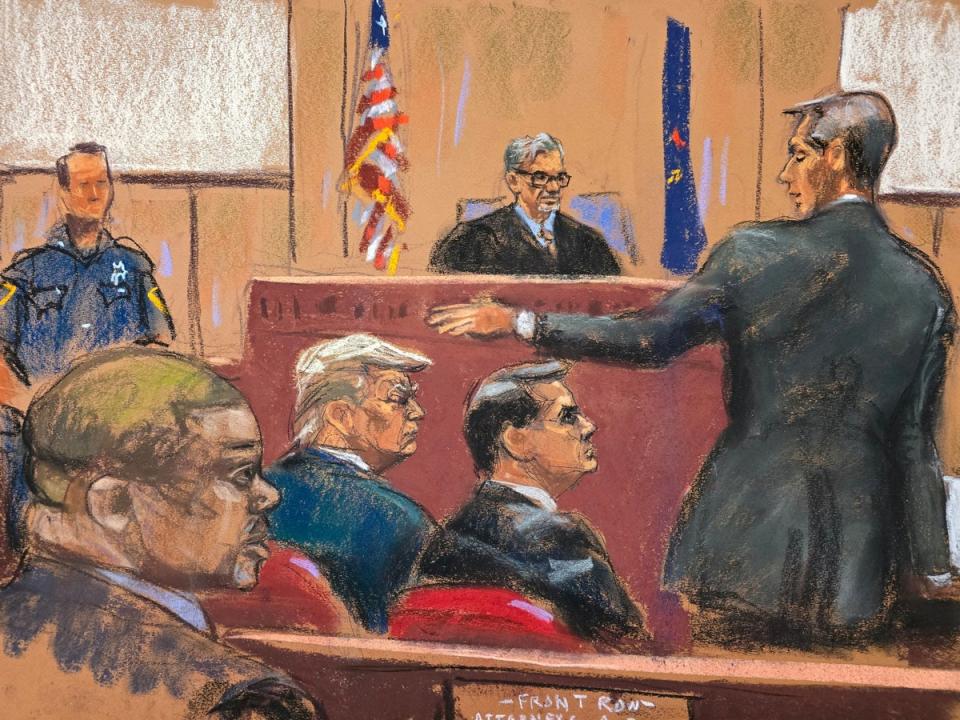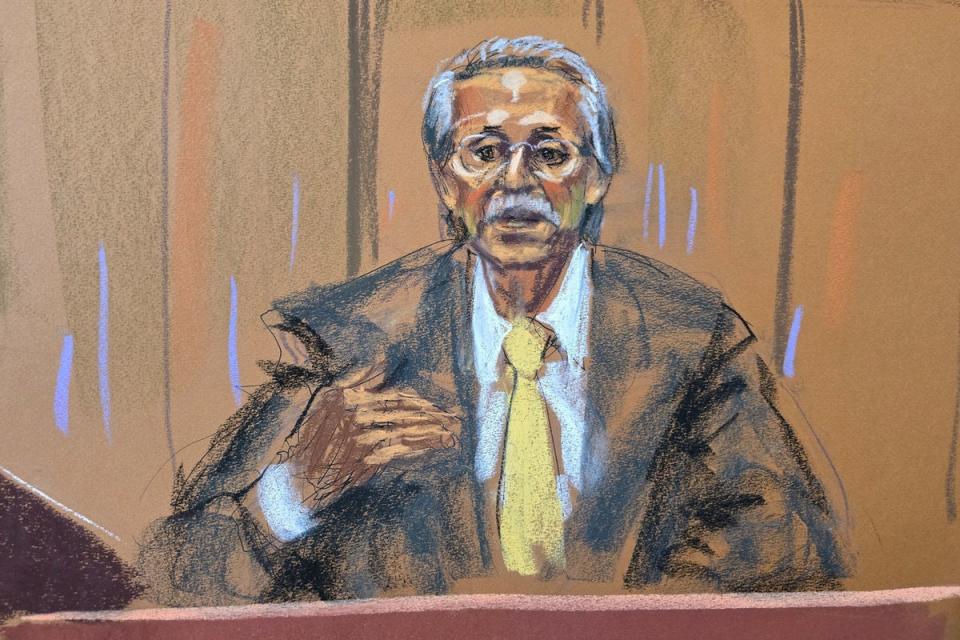Trump lashes out leaving court after jurors heard of 2016 ‘election fraud’ scheme in trial opening statements
Donald Trump unloaded on reporters and news cameras for nine minutes outside a Manhattan criminal courtroom on Monday, after jurors heard opening statements and the first witness took the stand to testify in the first-ever criminal trial of an American president.
“It’s very unfair what’s going on and I should be allowed to campaign,” he said as he left the courthouse. “We did nothing wrong.”
The former president is charged with 34 counts of falsifying business records as part of what prosecutors called a “criminal conspiracy” to bury politically compromising stories of his alleged affairs, part of a months-long scheme to protect Mr Trump’s reputation and deceive voters ahead of the 2016 presidential election.
After four days of jury selection last week, the trial on the 15th floor of a New York City criminal courtroom began on Monday with opening statements that outlined this alleged plot to unlawfully influence the election’s outcome.
Jurors also heard from the trial’s first witness in the case: David Pecker, the former CEO of American Media Inc, which publishes the supermarket tabloid National Enquirer.
The first words from Manhattan Assistant District Attorney Matthew Colangelo in the prosecution’s opening statement underscored the stakes of the case against the former president.
“This case is about a criminal conspiracy and a cover-up,” he said. “The defendant Donald Trump orchestrated a criminal scheme to corrupt the 2016 presidential election. Then he covered up that criminal conspiracy by lying in his business records, over and over and over again.”
The former president, who sank in his chair and stared in front of him during the prosecution’s opening statements, is accused of drawing up an agreement for a “catch-and-kill” scheme in 2015 with help from his-then attorney Michael Cohen and Mr Pecker – an alleged plot that is central to the so-called hush money case.
“No politician wants bad press. But the evidence of trial will show that this was not spin or communications strategy,” Mr Colangelo said.
“This was a planned, coordinated, long-running conspiracy … It was election fraud. Pure and simple.”
The trial adjourned early on Monday for Passover. It will continue on Tuesday morning, when prosecutors will demand that New York Justice Juan Merchan enforce the trial’s gag order against the former president after he has continued to attack witnesses on his social media platform Truth Social.

The case from Manhattan District Attorney Alvin Bragg is the first among Mr Trump’s four criminal cases to go to trial, and likely the Republican nominee’s only criminal trial before November’s general election.
Prosecutors have grounded the case in a straightforward narrative – his former attorney paid $130,000 to adult film star Stormy Daniels to prevent her from speaking publicly about her affair with Mr Trump, who has denied ever having sex with her.
Prosecutors allege that Mr Trump’s reimbursements were disguised as legal fees across 34 business records – 11 invoices, 11 cheques, and 12 ledger entries.
Prosecutors say Trump’s campaign was in ‘damage control mode’ before election
In laying out the state’s case, prosecutors plan to detail a months-long “catch-and-kill” agreement – in which the National Enquirer’s publishing company would buy up potentially politically damaging stories and boost positive ones for Mr Trump’s campaign, all leading up to the release of the so-called Access Hollywood tape just one month before Election Day 2016.
Mr Trump’s campaign “went into immediate damage control mode” to ensure that other allegations against the Republican candidate would not see the light of day – including allegations that Mr Trump had an affair with Ms Daniels years earlier, Mr Colangelo said.
“Tune out of the noise. Focus on the facts,” he told jurors. “Focus on the logical inferences that follow from those facts. Focus on the evidence, listen to the testimony, read the documents, emails, text messages, bank statements, handwritten notes, all of it.”
After the trial, when prosecutors return to the jurors for closing arguments after reviewing that evidence, all of it “inescapably leads to only one conclusion,” he said: “Donald Trump is guilty of 34 counts of falsifying business records in the first degree.”
Trump attorneys argue he ‘fought back’ to protect his reputation
In the defence’s opening statement, Todd Blanche, Mr Trump’s lead attorney in the case, argued that there is “nothing wrong with trying to influence an election”.
“It’s called democracy,” he said.
Instead of anything illegal, Mr Blanche argued that a series of payments to Mr Cohen in 2017 were merely for payments to a retainer agreement for legal services.
“What on earth is a crime? What is a crime about what I just described?” he asked.

The 34 counts against his client “are really just 34 pieces of paper”, including invoices, checks, and ledger entries from invoices that said “for retainer agreement for legal services”, according to Mr Blanche.
“None of this was a crime,” he said.
Attempts to bury politically damaging information and to suppress stories designed to “embarrass” Mr Trump and his family came during a period of time when there were “all kinds of salacious allegations going around” about him, Mr Blanche said.
“President Trump fought back” to “protect his reputation, his family, his brand,” he said.
Defence takes aim at Stormy Daniels and Michael Cohen
The defence also offered a glimpse into its plans to seek to undermine testimony from Cohen and Ms Daniels, the latter of whom “doesn’t have any idea” or “know anything” about the invoices, checks and ledger notes in the indictment, according to Mr Blanche.
“Her testimony, while salacious, does not matter,” he told jurors.
Mr Blanche, however, acknowledged that Ms Daniels had signed a non-disclosure agreement in October 2016 in exchange for $130,000, but Mr Trump’s reimbursements to Mr Cohen – who is accused of paying Ms Daniels for her silence – were not considered “a payback”.
Such an agreement was a “perfectly legal” means to avoid “embarrassing” Mr Trump, who has denied ever having an affair with the adult film star.

As for Mr Trump’s former attorney, a close ally turned nemesis, Mr Blanche said: “He cannot be trusted.”
“He rants and he raves about President Trump,” he added. “He criticises President Trump. He talks extensively about his desire to see President Trump go to prison. He has talked extensively about his desire to see President Trump’s family go to prison.”
His “financial livelihood depends on President Trump’s destruction,” according to Mr Blanche.
Jurors hear the realities of ‘chequebook journalism’
When Mr Pecker – the longtime former National Enquirer publisher and the trial’s first witness – briefly took the stand, he explained a concept that he called “chequebook journalism”, in which editors could spend up to $10,000 to investigate, produce or publish a story – a tabloid operation that separates publications like his from other media companies. Anything above that $10,000 spending limit would have to be vetted for approval, he said.
“The only thing that’s important is the cover of the magazine,” jurors heard from Mr Pecker, who explained that he would be involved from the concept to the cost of each story.
He also testified that the publication’s then editor-in-chief Dylan Howard – who is accused of tipping off Mr Trump about the Stormy Daniels story – would run “juicy” stories by him.
Mr Pecker also told jurors that he kept two email accounts, one for regular business and another for sensitive material that his assistant wouldn’t be able to see.
Mr Pecker has been granted immunity from prosecution in exchange for his testimony.
He confirmed that his appearance is under subpoena and that his attorney was present.

Prosecutors can grill Trump on defamation and fraud rulings if he testifies
Before opening statements got under way, Judge Merchan handed down his decision around another matter in the case: what exactly Mr Trump can be grilled about by prosecutors if he takes the stand to testify.
Last week, Judge Merchan held a Sandoval hearing to determine what can be used to impeach his credibility on the witness stand if he testifies in his own defence.
On Monday, the judge gave prosecutors the green light to bring up rulings in other Mr Trump cases, including where he was found liable for fraud and defamation, as well as his repeated violations of a gag order in the civil fraud case.
The former president has volunteered to testify, opening the door for prosecutors to grill him about his previous alleged misconduct.
Speaking at a press conference from his Mar-a-Lago home in Florida earlier this month, Mr Trump said: “Yeah, I would testify, absolutely. That’s not a trial. That’s a scam.”
If he does, he now faces the likelihood of prosecutors bringing up the verdicts in his blockbuster fraud trial and the E Jean Carroll defamation cases.

 Yahoo News
Yahoo News 
